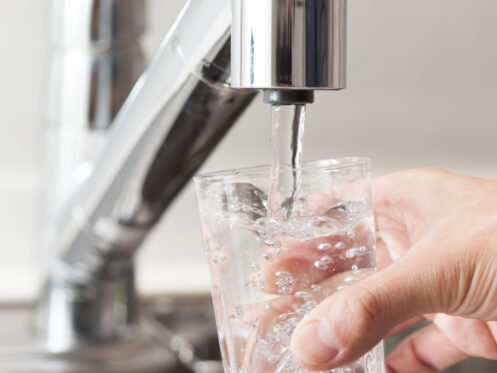Las Vegas, NV, is famous for its warm weather, vibrant nightlife, and unforgettable tourist attractions. Because of its location, however, Las Vegas also has a reputation for unique water quality challenges that affect every resident. One of the key challenges is the prevalence of hard water. Problems with water hardness can have a detrimental effect on everything from faucets to fixtures. But what is water hardness, and how can Las Vegas residents cope with the issue? A look at how local water quality impacts your plumbing can provide guidance on the best ways to safeguard your property.
Why Does Las Vegas Have Hard Water?
Hard water refers to water with a high concentration of dissolved mineral content. This type of water forms when rainwater, groundwater, or melted snow percolates through deposits of limestone, sandstone, chalk, or gypsum. In the Las Vegas Valley region, approximately 90% of the municipal water supply comes from Lake Mead. The original source of water for Lake Mead starts high in the Rocky Mountains. It then flows downward to the Colorado River, dissolving minerals like calcium and magnesium from the limestone and sandstone rocks located along the way.
The mineral-dense water finally settles in Lake Mead and provides water for most Las Vegas residences and businesses. According to the Las Vegas Valley Water District (LVVWD), the estimated hardness of Las Vegas water is 280 parts per million (PPM) or 16.0 grains per gallon (GPG). Scientists classify this measurement as “very hard” water. In fact, Las Vegas frequently ranks among the top 10 cities for hard water in the United States.
How Does Hard Water Affect Plumbing?
Hard water can wreak havoc on your plumbing system. Types of devastating damage that can result from hard water include mineral or scale buildup, reduced water flow, and corrosion. Other consequences may include lower water quality, damaged plumbing appliances, and higher utility expenses.
Mineral Buildup
Each time hard water flows through plumbing, it leaves behind mineral residue. As hard water continues to flow through the system, more minerals like calcium and magnesium carbonate adhere to the plumbing walls. This buildup narrows the opening of pipes and can eventually result in clogs. The buildup can also shorten the life expectancy of your indoor plumbing.
Scale Buildup
Hard water can also cause limescale buildup on plumbing faucets, fixtures, showerheads, and drains. These scale deposits leave behind a crusty, sticky, or white residue and are among the most noticeable signs of hard water. The scale deposits compromise the aesthetic appearance of faucets and fixtures but also impair their functionality for everyday tasks like cooking or bathing.
Corrosion
The calcium and magnesium ions in hard water can react with the metal components of your plumbing, oxidizing and resulting in corrosion over time. Any metal elements, like pipes, valves, bolts, fastenings, connections, or fittings, are vulnerable to corrosion. At the very least, corrosion requires extensive cleaning with the help of a professional plumber. Long-term corrosion can degrade the plumbing, weakening its structure and causing the system to disintegrate. This occurrence can require a pipe system replacement.
Reduced Water Flow
The accumulation of minerals can restrict the flow of water within your plumbing and obstruct the diameter of all pipes. This can make water pressure uncomfortably low and may hamper the performance of your water-based appliances. In fact, low water pressure is one of the most common complaints in households with hard water.
Reduced Water Quality
As it flows through your plumbing, hard water can carry along minerals and particles that have accumulated within the pipes. When it finally reaches your fixtures, the water can appear cloudy and have an unusual smell or taste. This problem is especially noticeable in the kitchen since the minerals in hard water can affect boiling times or recipes that require chemical reactions (such as baking). Hard water can also affect plumbing connections on major appliances like dishwashers or laundry machines.
Leaks or Broken Pipes
The minerals in hard water can weaken piping materials and cause the formation of small pores or hairline tears. Over time, however, these tears can grow larger until a full-on leak occurs. Since buildup from hard water can also block efficient flow, it can also cause pipes to break or burst if an inexperienced handyman tries to forcefully pump water through the system.
Water Heater Damage
Hard water can cause the accumulation of minerals or sediment in your water heater. This can result in an increase in maintenance or repair calls, as you will need a professional to flush the water heater more frequently. The minerals in hard water can also cause conventional storage-tank water heaters to take longer to reach desired temperatures. This can result in higher energy bills. In fact, the cost of heating hard water is as much as 30% higher than heating soft water. The excess strain of operating the appliance can also shorten the lifespan of the unit.
Higher Utility Costs
The leaks and pressure issues that can result from hard water all mean that your system will have to work harder to supply enough water for daily activities. In other words, damage from hard water causes water waste from leaking pipes, and you may need to run appliances longer to complete routine tasks. These factors can all create a drastic rise in utility bills.
Voided Warranties
Warranties cover breakdowns or defects that arise from the ordinary use of a product. However, some manufacturers expect homeowners to obtain hard water treatment as part of routine maintenance. Damage that results from untreated hard water can void warranties for many plumbing appliances and units.
What Is the Solution for Hard Water Issues?
Installing a whole-home water softener is an effective method to improve the quality of your household water supply. This method reduces water hardness by removing calcium and magnesium ions. It typically uses an ion exchange process to replace hard minerals with sodium or potassium ions. The reduction of hard minerals helps lower the risk of buildup in pipes, enabling smoother and more reliable water flow.
The use of whole-home water softeners may also improve the taste of drinking water and reduce limescale deposits on plumbing appliances and fixtures. Whole-home water softeners can help conserve the longevity of your pipes and any connected units. A whole-house system also means that the results are effective everywhere, from the laundry room to the kitchen.
Get Help Today
Due to the geographical location of Las Vegas, hard water is a fact of life for households and businesses. However, there is no need to suffer through the detrimental effects of this natural occurrence. Instead, you can elect to get help from the professionals today. Bumble Breeze offers plumbing solutions for Las Vegas and surrounding areas. We are experts in resolving hard water problems.
Our professionals can test indoor water hardness and offer water treatments such as whole-home water softeners. We also provide whole-home water filtration options. If you are already experiencing plumbing issues, we provide hydrojetting as well as drain cleaning. We offer repiping for the most severe problems. Whatever the issue, we can help.
Contact Bumble Breeze today for all your plumbing needs.


